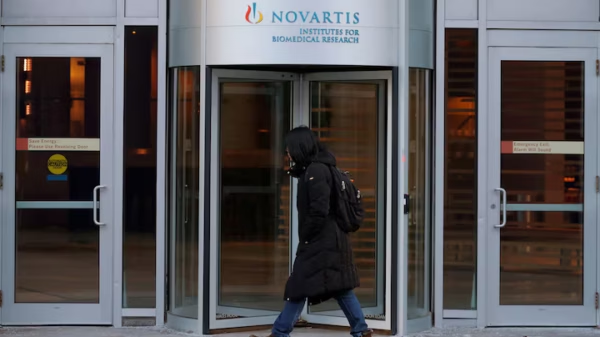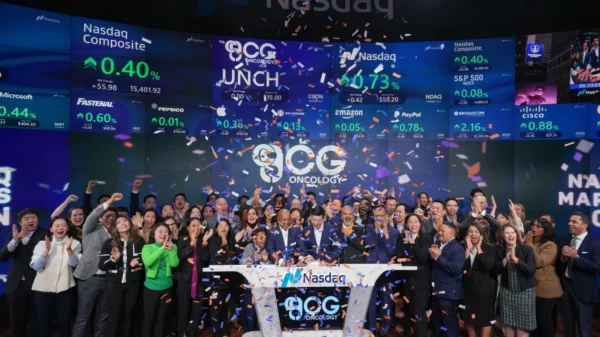Shares of Akero Therapeutics, Inc (NASDAQ: AKRO) climbed briefly over 100 per cent on the announcement of positive clinical results related to metabolic dysfunction-associated steatohepatitis (MASH), a disease which harms the liver.
On Monday, Akero released preliminary results from SYMMETRY, a phase 2b study involved in determining the use and security value for its product candidate efruxifermin (EFX) in patients with compensated cirrhosis, Child-Pugh Class A, because of MASH.
The results showed that 39 per cent of those treated with 50 mg of EFX for 96 weeks showed a reversal of cirrhosis without worsening MASH. This was compared to 15 per cent in the placebo group, which is statistically significant.
In a broader group, 29 per cent of patients in the EFX group experienced cirrhosis reversal, compared to 12 per cent in the placebo group. This includes those whose missing week 96 biopsies were counted as treatment failures.
The study also showed that the effect of EFX improved over time, with the percentage of patients experiencing cirrhosis reversal increasing from 10 per cent at week 36 to 24 per cent at week 96. This shows the benefit of extended EFX treatment for patients with compensated cirrhosis.
Furthermore, 45 per cent of those treated with EFX experienced cirrhosis reversal without worsening MASH in a subgroup of patients not on GLP-1 therapy at the start of the study. This was compared to 17 per cent in the placebo group. This indicates that the improvement was likely due to EFX treatment rather than GLP-1 therapy.
Read more: Orchestra BioMed shares get shot in the arm on solid clinical trial data
Read more: Personalis Inc share price jumps 50% on deals with Merck and Moderna
None of the adverse events related to Akero drug study
Patients generally tolerated EFX well. No deaths occurred in the EFX groups, while one patient in the placebo group died from pneumonia. Investigators determined that none of the serious adverse events were related to the study drug. Across both EFX groups, the most common adverse events were mild to moderate and involved gastrointestinal issues. A few of these include diarrhea, nausea, and increased appetite. These events didn’t last.
Currently, only one treatment for MASH exists on the market: Madrigal Pharmaceuticals‘ (NASDAQ: MDGL) THR-β selective agonist Rezdiffra (resmetirom), which the FDA approved last year. However, it is indicated only for non-cirrhotic patients with fibrosis, representing a lower level of liver scarring.
“Until today, we’ve not had the prospect of an effective treatment for compensated cirrhosis due to MASH, which is associated with high rates of short-term morbidity and mortality,” said Mazen Nourredin, M.D., Professor of Medicine and Transplant Hepatologist at Houston Methodist Hospital, and principal investigator for the SYMMETRY study.
According to the Canadian Liver Foundation, MASH is a more severe form of metabolic dysfunction-associated steatotic liver disease (MASLD). MASH was formerly known as non-alcoholic fatty liver disease (NAFLD).
While comprehensive data on MASH-specific mortality is lacking liver diseases collectively contribute to a significant number of deaths in Canada each year. For instance, there were 326,571 total deaths in Canada in 2023. This represents a 2.4 per cent decrease from 2022, according to Statistics Canada.
However, the exact proportion of these deaths attributable to liver diseases, including MASH, is not specified in the available data.
Read more: Breath Diagnostics onboards new president and closes critical financing
Read more: Breath Diagnostics pioneers novel lung cancer breath test
Multiple companies are moving to treat MASH
The incidence of this condition is expected to rise due to the increasing prevalence of obesity and type 2 diabetes.
In response, companies that produce GLP-1 drugs for weight loss are now shifting their focus to MASH treatment. Pharma giant Eli Lilly (NYSE: LLY) tested its drug, tirzepatide, in MASH patients. After a year, it reported more than half experienced an improvement in fibrosis. Meanwhile, Novo Nordisk (NYSE: NVO) also demonstrated promising results with its drug, semaglutide, in MASH patients. It showed that 37 per cent of recipients had a fibrosis improvement.
Despite this, RBC Capital Markets analyst Brian Abrahams expressed optimism about FGF21 drugs.
“AKRO’s data clearly endorse the potential for FGF21 agents such as ETNB’s pegoza to benefit more severe MASH [patients] that other classes such as GLP-1s may not address as well, maintaining hope for their long-term prospects and role,” he said in a client note.
.














